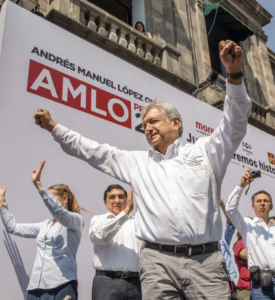Monocle’s Spring Weekly 04, June 2018
With just weeks to go until Mexico’s presidential election, Andrés Manuel López Obrador is the candidate to beat. He’s no orator but he’s making all the right noises.
Andrés Manuel López Obrador knows how to make an entrance. It’s early evening in the Mexico City borough of Álvaro Obregón and Mexico’s presidential frontrunner has just arrived at his latest rally on the back of a motorbike. Amid pushing, shoving and a few raised voices from those who have waited hours to see their star, the candidate is funnelled through the throng encircled by a protective cordon of people belonging to his National Regeneration Movement (Morena party).
With just weeks to go until the 1 July election, the man known as Amlo is comfortably in the lead. According to a poll, the 64-year-old leftist has a 20-point advantage over his nearest rival, 39-year-old lawyer Ricardo Anaya. Attending the rally, newspaper seller Mario Morales, 56, tells us why he’s voting for him: “He’s the only man who knows the smallest corners of Mexico, from Chiapas to Tijuana.” Morales has a point. No one has rushed around the country like him. According to official figures he had visited 102 cities in 26 states by mid-May compared to third-placed José Antonio Meade, whose coalition includes the ruling Institutional Revolutionary party (PRI) and who has visited 54 metropolises in 23 states.
Addressing the crowd, Amlo pulls out many of his stock sentences including condemning “la mafia del poder” (the power mafia) – a reference to corrupt elites. He’s no natural orator and his speech often sounds jerky as he struggles to find the right words. But it’s his fallibility – and his easy-to-comprehend language peppered with occasional jokes – that endears him to his supporters. In the two televised presidential debates to date López Obrador has shown he has the Trumpian skill of deflection. At last month’s second airing in Tijuana he parried a difficult question by taking out his wallet and joking that he needed to protect it from being robbed.
“I don’t think he has an ease with words,” says Elena Poniatowska, 86, a celebrated writer and social campaigner, sitting at home next to a cushion embroidered with an image of Amlo. A supporter from when he was Mexico City mayor from 2000 to 2005 – alongside failed presidential bids in 2006 and 2012 – she says there’s “something religious” about the way he is now greeted.
As Amlo waves at crowds, his closest rival Anaya is also attending a rally. Earlier in the day in Polanco he hosted a closed-door meeting with the agricultural sector, the sort of get-together that for some reinforces the idea that he’s pandering to the elite. In what has proved a vitriolic campaign, Anaya – who represents a left-right coalition – has been accused by his detractors of having suspicious offshore bank accounts and pushing business owners to cajole employees into voting for him. To many he represents the status quo. It’s an image reinforced by the fact he voted with Mexican president Enrique Peña Nieto on a series of structural reforms.
So does that make him a “change candidate”? “Of course,” he replies. “I’ve voted in favour of what I think is good for the country like education reform – although I think it was badly implemented – and I’ve voted against reforms that I think [adversely] affect the country.”
Peña Nieto’s presidency has been mired by a spike in drugs-related violence and by the state’s seeming willingness to cover up the murder of 43 students teachers in Iguala in 2014. “This election is going to be a referendum on Peña Nieto’s presidency,” says Genaro Lozano, a political scientist, columnist and TV presenter.
Perhaps the hardest job has been left to Meade. He has made a point of portraying himself as “his own man” and attempting to distance himself from luxury by travelling on commercial planes. The PRI, which held continuous power for much of the 20th century until the return of democracy in 2000, is still able to mobilise. A recent campaign stop in Campeche saw Meade inside a packed conference hall greeted by activists rattling football-style matracas. He manifests his clean reputation before shouting “We’re going to win!” Away from the crowds, he’s more reticent. “I’m convinced I have a good chance,” he says. But his failure to distance himself from Peña Nieto – or criticise the way he welcomed Donald Trump to Mexico – may be his downfall.
For now, Amlo’s lead seems unassailable. “It will be difficult for him not to win,” says Tania Montalvo, general editor at Verificado2018, a website created to counter fake news. “People see in Morena a hope for change,” says Khemvirg Puente Martínez, co-ordinator at the Mexico National University’s Centre for Political Studies, “even though they’re not certain what the consequences will be.” With candidates often sketchy on detail, perhaps simply the guarantee of change is good enough for now.
Relationship with the US
Mexico’s campaign has covered themes from security and poverty to removing immunity for politicians and equal pay for women. But Donald Trump and Nafta have never been far from the equation and dominated the most recent election debate in Tijuana. When Trump announced that he would slap import duties on steel, the government of incumbent Enrique Peña Nieto said it would respond with “equivalent measures”. Still, many Mexicans have not forgiven Peña Nieto for rolling out the red carpet for Trump. Ricardo Anaya told us that Peña Nieto made an “historic error” and, while he wanted a relationship with the US president, it needed to be one of “mutual respect”. Jose Antonio Meade told us that Nafta needs to be “more inclusive”. López Obrador, who has written a book entitled Oye, Trump (Listen, Trump), has counselled Peña Nieto to meet the US leader in person and be firm – but not to get sucked into a commercial war.

